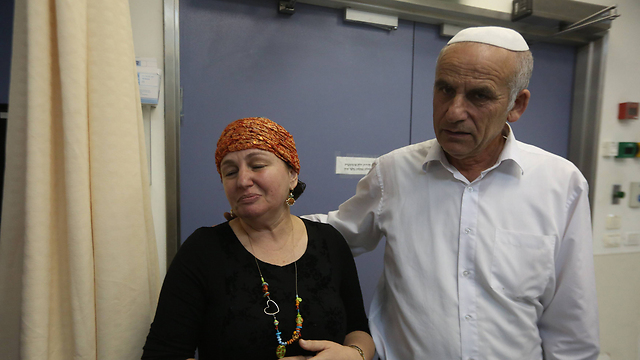Settlers: IDF needs to do more for us
A wave of terror attacks since the beginning of Ramadan and easing of travel restrictions for Palestinians is causing anxiety among Jewish residents of the West Bank.
Jews living in West Bank settlements say they fear for their safety and are frustrated by the authorities.
The last ten days have seen a rising wave of Palestinian terror attacks against Israeli citizens and security forces. Danny Gonen was killed on June 19, and on Monday Malachi Rosenfeld was murdered. In between, there were numerous incidents in which people were stabbed and firebombs and stones were thrown.
Defense Minister Moshe Ya'alon said the attacks were sanctioned and funded by Hamas in Turkey, while a senior IDF official said the attacks were carried out by isolated individuals.
Residents told Ynet of a sharp decline in the sense of security since the beginning of Ramadan, after restrictions were eased for Palestinians, and protested the failure to resolutely tackle terrorism.
Aharon Tavger, 33, a resident of Zeit Raanan in Gush Talmonim, said that alongside anxiety about incidents like those of the last few weeks, residents continue to live normal lives while hoping for stronger action by security forces.
"Waiting in the middle of the night at the hitchhiking stop in Jerusalem is no less scary than driving on roads in Judea and Samaria or walking around these areas," he said.
Tagver, like many residents in the West Bank, said that armored vehicles cannot solve the problem. "When there is a wave of robberies in Kfar Saba, you don't put a police officer at everyone's front door, but deal with the robbers," he said.
"The direction we need to go in is to deal with the problem at the root and start to work more on the intelligence level and on identifying terrorist elements in the Palestinian villages."
Batya, 24, a mother of three and resident of a settlement in Gush Shilo, said that she has been afraid since Monday's terror attack. "It was right under the house," she said. "I have a feeling of insecurity, anxiety for my husband and children who need to leave town and drive on the roads.
"But we must emphasize that we will not leave here and will not run away. The army must do its job better. As soon as something like this happens, like a murderous terror attack, we expect them to take more precautions like closing roads to Palestinian traffic and increasing military presence."
She noted that a number of residents in Gush Shilo have already decided not to be on the roads until the situation is calmer. "My neighbor heard cries of joy from the Palestinian village next to us," she said. "She's traumatized by it. I would have expected the military to go in immediately and silence the celebrations.
"Before I leave the house I think twice about how to drive and on what road. There's a problem when the government doesn't have a real response and doesn't take care of its citizens. A week ago the authorities demolished a few buildings next to us, and demolition leads to an increase in security for Palestinians. The answer to terror attacks is to keep building and settling."
Dina Cohen, a mother of three who lives in Binyamin, drives on Route 60 to work every day. "These incidents occur all over Israel," she said. "Protecting vehicles and posting soldiers will not provide a solution.
"There is a deeply rooted problem that requires a much wider solution. I am not a security expert and I have no solution, but the bottom line is that I only want to drive home in safety and for my kids to be happy."
Shin Bet chief Yoram Cohen on Tuesday discussed the recent events in the West Bank. He said that since 2012, there has been a 50 per cent annual increase in acts of popular terrorism (683 in 2012 and 1,834 in 2014), with the sharpest increase occurring during Operation Protective Edge.











